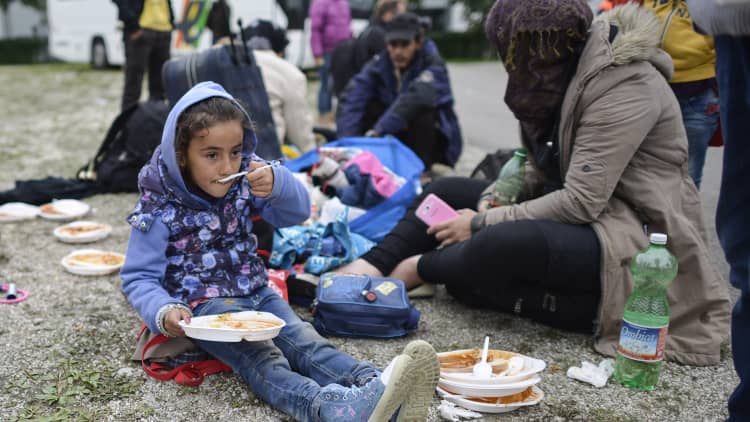
European and Turkish leaders are meeting in Brussels for an emergency summit on Monday as the region fails to muster a collective response to the ongoing migrant crisis in the region.
The summit is expected to focus on how Turkey will spend 3 billion euros ($3.3 billion) worth of aid given to the country by the EU in order to stem the flow of migrants coming to Europe. The 28-member bloc is also expected to ask Turkey to take back thousands of migrants who are deemed to be economic migrants rather than refugees.
Turkish Prime Minister Ahmet Davutoglu said on Monday that the summit showed that his country was "indispensable for Europe, and Europe indispensable for Turkey," Reuters reported. He also said that the summit would also address Turkey's hopes for accession to EU club.
Davutoglu said Turkey was willing to take back all non-Syrian migrants denied asylum in Europe as well as all those intercepted in its territorial waters, and to crack down harder on people smugglers, Reuters reported.
An emergency EU-Turkey summit, originally planned to last half a day, was extended to give Davutoglu a chance to present "new ideas" going beyond Ankara's commitments so far.
The 28 EU leaders would deliberate on his proposals in the afternoon and meet him again to discuss them over dinner, an EU official said.
Thousands of migrants continue to arrive in Europe every week with the majority fleeing civil war in Syria in the Middle East, although many are coming from impoverished countries in Africa and the Middle East and are seen as economic migrants rather than asylum seekers.
While many are travelling by land via Turkey, thousands are arriving by sea (also travelling from Turkish shores). Southern European countries, Greece in particular, are struggling with the amount of people arriving. The UN estimated that more than a million migrants arrived in Europe in 2015. Turkey is estimated to be hosting around 2 million Syrian refugees.
The migrant crisis has prompted deep tensions within the region and between countries with Austria, the Western Balkans and Eastern Europe – that have become conduits for migrants heading to richer northern Europe – refusing migrants entry. Some have closed borders and opposed the EU's plans to resettle migrants throughout the bloc using a quota system.
That has left around 30,000 migrants effectively stranded in Greece on the border with Macedonia as they are unable to travel onwards, putting more pressure on already-stretched resources and making Greece feel abandoned by its European neighbors. Arriving for the summit, Greek Prime Minister Alexis Tsipras said the EU needed to accelerate its migrant relocation process.
'Make or break' moment?
Asked whether the summit on Monday could be a "make or break" moment for Europe as splits remain among the members, Joan Hoey, European analyst at The Economist Intelligence Unit, told CNBC that the meeting was certainly important.
"It's probably not a 'make or break' moment as we know how the EU operates, it just goes on and on trying to find a solution. I think it is quite important however in terms of the EU trying to establish its authority and trying to arrest the slide towards national policy making on this question which was demonstrated a week or so ago when Austria and nine Balkan countries decided to make up their own policy," she said.
Hoey said the summit would see more pressure being placed on Turkey to stem the flow of migrants and expectations that Greece would open more reception centers to process migrants.
"But even if there are some results in terms of Turkey clamping down on smugglers and stopping the flow of migrants across the Aegean (Sea) and Greece accepting more, where are those migrants going to go? Is it going to be in Greece, a country on its last legs after eight years of recession? And are these European countries going to sign up to a quota system with which they fundamentally disagree?"
As the numbers of migrants have continued to swell, public opinion has become polarized over the migration crisis and whether Europe should accept so many newcomers. That change in sentiment is being borne out in the political scene now too.
On Saturday, far-right, anti-immigrant parties gained many more votes than expected in a general election in Slovakia, for example, and Chancellor Angela Merkel, who has opened Germany's doors to migrants, could see support for her party fall at regional elections later this week after criticism of her refugee policy.
At the weekend, Merkel accused the anti-immigrant party Alternative for Germany (AfD) party, which has seen its support base grow amid the migrant crisis, of stirring up prejudice and polarizing society. Speaking to newspaper Bild am Sonntag, Merkel also reiterated her call for more EU cooperation over migration: "We can only meet this challenge together," she said.



